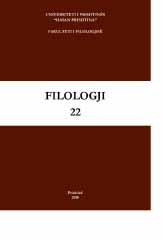SHEKSPIRI DHE SHEKULLI YNË (Në 400- vjetorin e vdekjes)
SHAKESPEARE AND OUR CENTURY (On the 400th anniversary of his death)
Author(s): Osman GashiSubject(s): Language and Literature Studies, Literary Texts, Theory of Literature
Published by: Univeristeti i Prishtinës, Fakulteti i Filologjisë
Summary/Abstract: William Shakespeare is not only the most well-known writer, playwright, poet, chronicler and creator of unfathomable artistic and literary value, but also an institution which needs to be approached and analyzed from an interdisciplinary viewpoint, true to the expression of his contemporary, Ben Johnson: “He was not of an age, but for all time!”The sources of Shakespeare’s work are of all sorts, ranging from mythological and religious to literary and historical, noteworthy of which are Plutarch’s “Parallel Lives,” Aeschylus’, Sophocles’, Euripides’ tragedies, Homer’s and Virgil’s epics, Pindar’s poetry, etc. However, we first need to specifically acknowledge that Shakespeare “seems to have been influenced by the new humanist movement, influenced by the work of French essayist Michel de Montaigne. Furthermore, many of Shakespeare’s plays express an assessment of the Aristotelian concept that virtuous actions “are a golden thought between fear and protection in war.”Every period after the Renaissance has produced or at least has tried to produce its own Shakespeare. Romantic English poets William Wordsworth and Samuel Taylor Coleridge published their joint collection of poems called “Lyrical Ballads.” Wordsworth included fragments from Shakespeare’s Macbeth; John Keats alluded to Shakespeare and was influenced by him whereas Coleridge was considered to be the true Shakespearean of Romanticism. Similarities in the domain of structure and content can also be found between Shakespeare and Cervantes, e.g. content interposition – play within a play in Hamlet and independent novellas (mostly drawn from “Exemplary Novels”) within Don Quixote.Moreover, Hamlet was regarded as an intellectual with insufficient willpower, sublime and noble in thoughts and words, but unable to act. Many stylistic and conceptual movements and orientations were kindled through this postulate: Byronism, Satanism, Mal du siècle and Weltschmerz. Yet, unlike romanticists, Shakespeare’s characters are persons with deeply humanist attributes, even in times of internal contradiction, “masters of the pen and sword.”Percy Bysshe Shelley’s assertion that writers are not only creators of epochs but also creatures of epochs is applicable to Shakespeare. Shakespeare set the cornerstones of English and European humanism, and as such he and his multidimensional work became part of the best literary tradition and leaders of the epochs to come. His legacy is present to this day in theater, film, Western philosophy, the English language but also in the lives of ordinary people.
Journal: FILOLOGJI
- Issue Year: 2018
- Issue No: 22
- Page Range: 115 - 122
- Page Count: 8
- Language: Albanian

